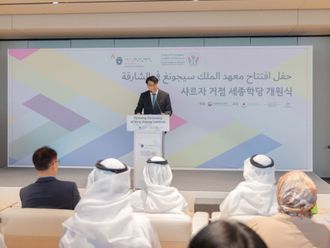Dubai: A prominent journalists’ association in India has urged the public to be watchful of the accuracy of the news they consume due to repeated instances of fake news going viral across the country.
The statement by the Foundation for Media Professionals (FMP) follows a Gulf News report on a falsely-attributed video clip that was circulated on Indian media last week ahead of Indian Prime Minister Narendra Modi’s visit to the UAE. The clip and the accompanying stories had falsely attributed a two-year-old video where UAE-based commentator Sultan Sooud Al Qassemi says a Hindu prayer greeting to the deity Ram, to His Highness Shaikh Mohammad Bin Zayed Al Nahyan, Crown Prince of Abu Dhabi and Deputy Supreme Commander of the UAE Armed Forces.
Indian media scrambles after being called out on fake news clip on UAE
Fake news: Viral video clip in Indian media spreads false propaganda on UAE
“Around the time of Prime Minister Narendra Modi's visit this month to United Arab Emirates, a video clip purportedly of the Crown Prince of Abu Dhabi, Shaikh Mohammad Bin Zayed Al Nahyan, saying ‘Jai Siya Ram’, played out not only on the social media but even on mainstream television news channels such as Times Now and Zee News,” said the FMP statement issued by its president and well-known Indian journalist, political commentator and author Paranjoy Guha Thakurta, and its Northeast convenor Samrat Choudhury.
“A prominent newspaper in the UAE, Gulf News, took the publication of this information to be a clear indication that the ‘mainstream media in India is falling prey to propaganda and fake news,’ and wondered whether this was ‘by choice’ or whether media personnel in India were ‘incapable of verifying basic facts – which forms the backbone of responsible journalism’. The FMP shares the concerns raised about the falling media standards in India,” the statement said.
Since being published on Monday, the Gulf News column has been widely shared and extensively quoted in Indian media, with publications ranging from the mainstream Outlook magazine to major digital publications such The Print, The Wire, Alt News and Quint terming the report as busting fake news with facts. The column was quoted by top journalists and commentators in the country as yet another example showing how some partisan news outfits were damaging the credibility of Indian media. It also triggered a wider debate on the politics of fake news, with some users on social media calling for more stringent norms by the Editors Guild in India to prevent such embarrassing and misleading episodes from recurring.
Citing several other “egregious examples” of fake news being peddled across media networks in India or news outlets failing to verify basic facts before publication, the FMP said: “When some of the biggest names in Indian journalism, such as India Today, the Times Group and Zee News, manage in the space of a few days to either disseminate fake news or act in support of those spreading fake news, it is a cause for grave concern.”












